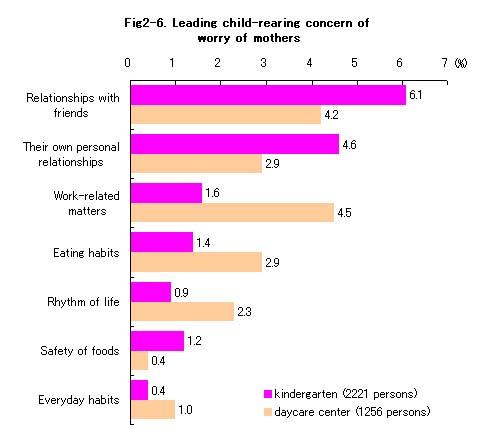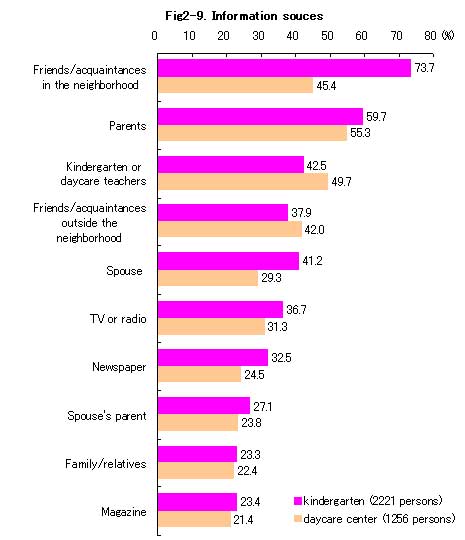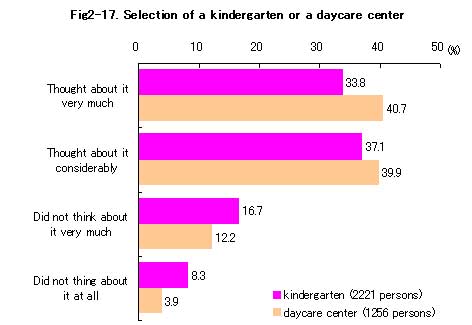The mothers who participated were parents of pre-school children.
This article is a summary of "Chapter 2 - Child rearing concerns and child discipline".
| Chapter 2 Child rearing concerns and child discipline |
| Tei Yamaoka |
Section 1 Concerns and worries about child rearing
Safety, discipline, and eating habits are matters of great concern
Participating mothers were asked to indicate which of the 45 items applied to their concerns and worries about child rearing, and multiple responses were allowed. Reflecting recent disturbing social incidents, the leading concern is involvement in crime and accidents by children (75.6%). The top five concerns are: how to praise or scold the child (47.0%), how to discipline the child (46.8%), the child's relationships with friends (46.1%), and providing a good nutritional balance and diet in terms of quality and quantity (43.8%). Almost all of the top ten concerns and worries about child rearing are related to child discipline and eating habits.
Compared to the results of the same survey conducted in 1997, the ranking of the leading concerns is the same, but the percentages are lower: 1) how to praise or scold (59.9%), 2) how to discipline (51.1%), and 3) relationship with friends (49.9%). Involvement in crime and accidents was not included on the survey in 1997.
The percentage of mothers concerned about their children's eating habits has decreased: from 39.8% (in 1997) to 29.4 % (in 2003) for food safety, 34.6% to 19.8% for food poisoning, and 23.8% to 11.0% for ecology and environmental issues. These were common concerns in 1997 because dioxin and endocrine disrupters were in the news at the time. On the other hand, percentages have increased for nutritional balance and diet (39.8% in 1997 to 43.8% in 2003) and eating habits (39.1% to 42.8%). These concerns are ranked as fifth and sixth in 2003. Social interest has shifted to issues related to eating habits at home.
|
Concerns and worries by yochien (kindergarten) or hoikuen (daycare centers) attendance
Among participating mothers, 95.4% of full-time housewives, 40.9% of part-time workers, and 12.2% of full-time workers send their children to a kindergarten; while the children of 4.6% of full-time housewives, 59.1% of part-timers, and 87.8% of full-timers go to a daycare center.
Mothers of kindergarteners tend to worry about community safety as well as their children's and their own personal relationships as indicated by their concern regarding involvement in crimes and accidents, the child's relationships with friends and their own personal relationships. In addition to food safety, lunch from home/school lunch, and changing clothes, a high proportion of these mothers are also concerned about finding a purpose or personal challenge in their own lives. In their replies, mothers of children at a daycare center are more likely to be concerned about instilling everyday habits such as eating habits, brushing teeth and washing hands, and regular times to go to bed and wake up. These mothers also tend to be concerned about their own work or work-related matters and academically preparing their children for elementary school.
In the survey, 136 mothers chose "other," and wrote comments about their worries in the space provided. The top three concerns are money-related matters (23.5%), the child's relationship with siblings (12.5%), and mothers' balancing of career and family (11.8%). To summarize, the leading child-rearing concern or worry is involvement in crime and accidents, followed by the items related mainly to eating habits, discipline, and relationships with friends. Mothers with children in the same age group have different child-rearing concerns and worries depending whether their children go to a kindergarten or a daycare center.
Shift from discipline and everyday habits to fostering sociality
Concerns and worries about child rearing change as the child gets older. The older the child becomes, the less the mother is concerned about instilling everyday discipline such as eating habits, table manners, bed-wetting and toilet training as well as changing clothes. On the other hand, mothers tend to be concerned about how to praise or scold children, relationships with friends, and learning daily greetings and expressing gratitude that foster sociality and personal relationships. Mothers' interests then shift to academic preparation for entering elementary school.
|
Section 2 The leading concern or worry about child rearing
Work-related matters are a big concern for working mothers
Figure 2-6 compares the leading child-rearing concern or worry of mothers today by kindergarten or daycare center attendance. The mothers of kindergarteners are more likely to worry about their children's relationships with friends and their own personal relationships, because both mothers and children socialize with others after school. Mothers of children at daycare, on the other hand, tend to worry about everyday habits including regular times to go to bed and wake up as well as sleep time and habits because of the possible effect of the afternoon nap. In addition, work-related matters also appear to be a major concern.

Regarding their degree of satisfaction as a working woman, 10.5% of full-time working mothers who are not satisfied very much and 15.8% of those who are not satisfied at all stated that job-related matters are a major concern. Job-related matters received the highest percentage of responses from working mothers.
Moreover, 73.7% of full-time working mothers and 30.2% of part-time working mothers who are not satisfied at all as a working woman feel that working while raising children is very burdensome. The results reflect the difficult situation faced by mothers who work long hours, suggesting that working mothers with children need support systems at home, at work, and in the community.
Mothers are most concerned about their child being involved in crime or accidents. Concern regarding the child's personality, attitude or situation is now ranked third, but still ranked ninth when multiple responses are considered. Two out of the top ten major concerns are about the mothers themselves. |
Section 3 Sources of information concerning child discipline and education
From among a variety of information sources on child discipline and education, mothers rely on friends, parents, kindergarten or daycare teachers, and their spouse. In addition, mothers select the information source depending on the type of concern and worry they have.
Top four information sources: friends/acquaintances in the neighborhood, parents, kindergarten or daycare teachers, and friends/acquaintances outside the neighborhood
When asked about sources of information on child discipline and education (multiple answers acceptable), the most common are: friends/acquaintances in the neighborhood (63.5%); parents (58.2%); kindergarten or daycare teachers (45.1%); friends/acquaintances outside the neighborhood (39.4%); and their spouse (36.9%). Compared to the same survey conducted in 1997, the percentage of mothers who chose kindergarten or daycare teachers is lower (55.7% in 1997), while the number of mothers who rely on friends/acquaintances outside the neighborhood is higher (27.9% in 1997). In addition, 8.6% use the Internet, which was utilized by only 1.1% in 1997.
As Figure 2-9 shows, mothers of kindergarteners rely on more sources of information for nearly all the items listed compared with mothers of children at daycare. Teachers in daycare centers and friends/acquaintances outside the neighborhood are the only sources that mothers of children at daycare use more often than mothers of kindergarteners. When full-time housewives and full-time workers are compared, housewives are more likely to consult a public health worker or dietitian, specialized books such as child-rearing manuals or textbooks, and distance-learning materials for parents, while working mothers tend to rely on their own children, medical doctors or clinical nurses, the Internet, and other sources. According to the responses, 139 mothers obtain information sources other than those listed, and most of them cited themselves (29.5%). They also rely on work-related acquaintances (17.8%) and or acquaintances made at kindergarten or daycare centers (15.5%). Other sources of information include other people whom they respect, that is, acquaintances made through religious activities or lectures.

|
Section 4 Reliable sources of information on child discipline and education
Different sources of information depending on worry and concern
Full-time housewives consult friends/acquaintances in the neighborhood and their spouse more often than the mothers working part-time or full-time. Housewives appear to utilize the information network in the community. On the other hand, full-time working mothers rely on kindergarten and daycare teachers and friends/acquaintances outside the neighborhood such as co-workers and old friends. The responses of part-timers are placed somewhere in-between. Compared to the other two categories of mothers, part-timers ask their parents for advice and rely less on the media including newspapers, TV, or specialized books.
Next, the relationship between the leading child-rearing concern or worry and reliable sources of information is examined. Mothers who worry about bed-wetting/toilet training tend to rely on friends/acquaintances in the neighborhood, while mothers who are concerned about eating habits and illness or injury consult their parents more often. Teachers in kindergartens or daycare centers appear to be a reliable source of information on child discipline, video games and mental distress, while teachers of courses taken as hobby or for individual enrichment appear to provide helpful information on preparation for elementary school, how to praise or scold children, and physical (health) problems experienced by the mother. Counselors or social workers on psychology offer consultation to mothers who are concerned about their own personal relationships.
As for the media as a source of information, mothers who worry about child discipline tend to rely on child-rearing magazines and specialized books such as child-rearing manuals or textbooks. On the other hand, those who are concerned about finding a purpose or personal challenge in their own lives cited the newspapers as their media source. In addition, mothers who have work-related concerns use the Internet as a source of information. The mothers appear to utilize different sources of information depending on their concerns and worries. |
Section 5 Child discipline at home and educational policy
Most of the mothers pointed out that they try to encourage their children to be socially cooperative with a high regard for interpersonal communication as well as foster independence at home. The behavior and qualities that mothers emphasize vary depending on their circumstances.
Girls are expected to learn social and homemaking skills, boys are expected to energetically play outside
Mothers were asked which of the 19 activities best described what they encouraged their children to do and multiple responses were accepted. The activity receiving the highest percentage was learning daily greetings and expressing gratitude (85.5%), followed by having children take care of their own affairs as much as possible (75.6%) and teaching children to get along with friends (73.2%). Mothers of girls tend to give priority to learning daily greetings and expressing gratitude (87.3%) and having the children take care of their own affairs as much as possible (79.1%). They stress the importance of teaching children to get along with friends (74.6%), not using bad or rough language (61.5%), and helping with housework (27.3%). These results show that mothers of girls are concerned about instilling consideration and care for others as well as homemaking skills. Mothers of boys are more likely to try to have the children play outside (43.9%) and restrict the time allowed to play video games (22.7%). Mothers of boys want them to play outside and get physical exercise, not stay inside.
Although the questionnaire content has been partially revised, the top three concerns of mothers remain the same as in 1997: learning daily greetings and expressing gratitude (89.3%), getting along with friends (67.1%), regular daily habits including waking-time and bedtime (58.9%).
Working mothers think mealtimes with the family is important, while housewives stress child discipline
The concerns and worries of working mothers and housewives clearly differ in their responses related to child discipline and educational policy.
Compared to full-time and the part-time working mothers, housewives appear to be concerned more about teaching children to get along with friends (housewives, 76%; part-timers, 71.8%; full-timers, 69.3%), regular daily habits including waking-time and bedtime (59%, 53.8%, 54% respectively), providing safe and healthy food (22.8%, 17.1%, 21.4%), restricting time allowed to play video games (21.1%, 19.9%, 10.3%), and restricting TV viewing (18.3%, 12.8%, 13.9%). On the other hand, working mothers try to ensure that the family has meals together (39.6%, 46.4%, 47.5%), restrict children's intake of sweets, including soft drinks, juice, and chocolates as much as possible (24.0%, 23.1%, 28.7%), and praise rather than scold (23.7%, 20.5%, 27.1%). The results show that working mothers try to spend family time productively and effectively, while housewives try to regulate their children's daily lives including the TV viewing. Working mothers try to ensure that the family eats together, either at home and outside. Some answered that they try to eat meals together as much as possible, even though the older child gets home late from private tutoring school and the husband works overtime. |
Section 6 Selection of a kindergarten or a daycare center
74.4% carefully consider the selection of a kindergarten or daycare
When the mothers were asked if they considered quality and particular type of the facility when choosing a kindergarten or a daycare center, 74.4% answered that they thought about it very much or considerably, while 21.8% answered they did not think about it very much or at all. The results show that mothers of the children at a daycare center give more consideration to the selection of the facility than mothers of kindergarteners. (Figure 2-17)

Differences in criteria by kindergarten or daycare selection and educational policy at home
Criteria that mothers consider to be important vary depending on whether kindergarten and daycare center is selected or the educational policy at home. Important criteria in kindergarten selection are 1) proximity to the home (59.9%), 2) pleasant atmosphere (56.9%), 3) cheerful children (43.3%), 4) good reputation (36.2%), and 5) reliability of the director and teachers (34.3%). Important criteria in the selection of a daycare center are 1) proximity to the home (74.5%), 2) convenience for commuting parents (44.4%), 3) pleasant atmosphere (44.4%), 4) long hours of operation (43.9%), and 5) provision of lunch (39.6%). In neither case do mothers give much consideration to academic skills such as reading, writing, and math; and an environment conducive to preparing the child for elementary-school entrance exams. This is probably because the mothers expect these academic skills to be provided in a different setting.
Examining the large differences in criteria, we see that mothers with children in daycare give greater priority to convenience for commuting parents, longer hours of operation, provision of lunch, and good facilities and toys. Mothers of kindergarteners give greater priority to pleasant atmosphere, cheerfulness of the other children, reliability of the director and teachers, excellence of child-care/education policy, inexpensive fees, attendance by the child's friend, and agreement with the educational policy of the kindergarten. Of the 307 mothers who listed other criteria, most cited 1) attendance by a sibling (18.6%), 2) allowing children to play outdoor freely (12.4%), 3) possibility of attending elementary school in the same school district (8.5%), and 4) a large play area (7.5%).
In their selection of a kindergarten or a daycare center, housewives considered more features than did working mothers. In addition, mothers of a first child and mothers of younger children took more criteria into consideration than mothers of a second child or later and mothers of older children. In summary, mothers of a kindergartener, mothers of a first child, and mothers of a younger child consider more criteria when they select a kindergarten or a daycare center. The following criteria: proximity to the home, pleasant atmosphere, good reputation, convenience for commuting parents, long hours of operation, and provision of lunch are given priority over the acquisition of academic skills. |
Latest Posts in this Category:

















